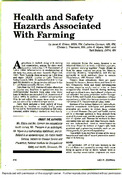| dc.description.abstract | IN recent years, food safety standards have become a more prominent issue
for global trade in agricultural and food products (Jaffee and Henson, 2004a;
and Josling et al., 2004). Of particular concern is the potential impact of food safety
standards, whether promulgated by governments or private sector buyers, on the
ability of developing countries to gain and maintain access to markets for highvalue agricultural and food products, especially in industrialised countries. In part
this reflects the growing preponderance of these standards, but also more widespread recognition of the degree and manner in which trade flows can be affected.
Concerns are greatest in the case of low-income countries, given their typically
weaker food safety and quality management capacities that can thwart efforts
towards export-led agricultural diversification and rural development.
This paper explores the impact that food safety standards are having on the
performance of developing countries with respect to agricultural and food product
exports, drawing on a programme of research at the World Bank (see World Bank,
2005). While recognising that food safety and quality standards can act to impede
exports, an attempt is made to ‘rebalance’ the policy debate in this area. The paper
outlines how the proliferation and increased stringency of food safety standards
is creating a new landscape that, in certain circumstances, can form a basis for
the competitive repositioning and enhanced export performance of developing
countries. In particular, the foundations of this competitive repositioning is
explored and related, in turn, to the manner in which developing country governments and/or private sector suppliers respond to evolving standards. | en_US |

